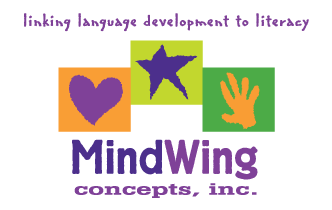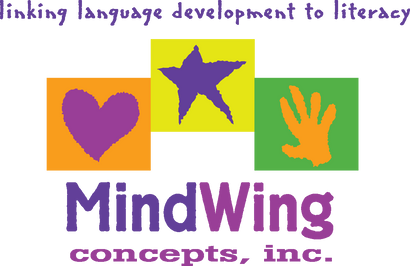Menu
-
- Home
-
About Us
-
The Approach
-
Linking Language & Literacy
-
MindWing Learning
-
Learning Resources
-
SHOP
-
Blog
-
- About MindWing
- Our People
- Contact Us
- Your Account
- Login
-
Spain (EUR €)

A Gift to a Character!
December 18, 2012

‘Tis the season! No matter what one’s religious beliefs are, the holiday season involves giving, and this is a context that is ripe for critical thinking, description, perspective-taking, and social scripts. It can be quite difficult to engineer learning situations in which children are giving each other actual gifts, what with the need for stores, money, and the fine-motor aspects of wrapping. However, technology can cut through some of that sticky tape for us and provide us with a virtual-gift-giving activity!
I first learned of the Gift Wrap App (FREE for iPad)...
Put the Story on Stage with Puppet Pals!
December 07, 2012

There are a great many easy-to-use apps for iPad that fall into the category of digital storytelling. This may sound like a daunting concept, but digital storytelling is just using technological tools such as digital pictures, video, audio, animation, or drawing in order to convey a story or information. Apps that combine these tools use the intuitive interface of the iPad to bring together different kinds of content in an engaging process of creation — all with your fingertips. Even better, these apps provide a great context to utilize Mindwing Tools such as Braidy, the StoryBraid, Story Grammar Marker, ThemeMaker and their accompanying story or expository planning maps...
Taking Paper Out of the Story
August 24, 2012
The arrival of the iPad has presented us with all kinds of opportunities to boost the engagement factor for our students. In many cases, students will be more engaged in what we would consider “paper and pencil” tasks when we “app-itize” them utilizing some of the tools available as free or cheap apps. For example, in recent posts on my blog SpeechTechie, I discussed how the iBooks app could be used to excite students about printed materials and also present PDF files that are often provided with published intervention materials (you don’t need to read those posts to understand this one, but they provide some related information)...
You (as a character) Are A Social Detective!
May 04, 2012

On the heels of Autism Awareness Month, I wanted to highlight a product that provides a terrific complement to use of the Story Grammar Marker® for treatment of social learning and narrative deficits for students with autism spectrum and related disorders. You Are a Social Detective is a CD-ROM product (compatible with Mac and Windows systems) created by Michelle Garcia Winner of Social Thinking® in conjunction with the folks at Social Skill Builders. The program is based on the popular comic of the same name, which provides a visual primer on basic social thinking concepts such as expected and unexpected behaviors and their effects on others, “thinking with the eyes,” and making “smart vs. wacky” guesses. Many children on the autism spectrum require explicit and consistent teaching of these concepts and coaching in their application across the school day...
Using SGM and Thememaker for Project-Based Learning
April 03, 2012
Project-Based Learning (PBL) is a recent trend in educational design, and involves presenting students with real-world contextual tasks that relate to curriculum areas. PBL is a great approach for Speech-Language Pathologists and Special Educators to employ as our students benefit from having their learning relate to personally relevant and functional content. To learn more about PBL, watch this great video from Common Craft. One tool that has been integrated as a kind of PBL is the “Webquest,” a set of web pages that outline a task and provide web-based resources for its completion. Webquests are not new, and teachers have been developing them for some time. There is a particular Webquest that I wanted to share with you in this post, particularly because it is one you could use in classroom, small group, or even individual language therapy while integrating Story Grammar Marker® and Thememaker® tools in the process...
This Vacation Week, Take the Kids to a New Setting: Disneyland!
February 13, 2012
 In the Northeast at least, February means school vacation week, and who doesn’t like Disney? Disney’s parks are based on its countless characters and, of course, narratives, and the company recently released a FREE iPad app that allows children to explore Disneyland. Disneyland Explorer (iPad only) provides a touch-navigable visual environment allowing kids to visit a huge variety of themed settings (Adventureland, Critter Country, Fantasyland, Frontierland, Tomorrowland, and so on, and that’s only in Disneyland proper) as they tap to reveal additional photos, videos and music. The app is naturally designed to lure tourists to Disney’s parks, but in the process it provides a primer in the element of Setting, providing a context for clinicians to develop students ability to describe locations, themes, and even genres...
In the Northeast at least, February means school vacation week, and who doesn’t like Disney? Disney’s parks are based on its countless characters and, of course, narratives, and the company recently released a FREE iPad app that allows children to explore Disneyland. Disneyland Explorer (iPad only) provides a touch-navigable visual environment allowing kids to visit a huge variety of themed settings (Adventureland, Critter Country, Fantasyland, Frontierland, Tomorrowland, and so on, and that’s only in Disneyland proper) as they tap to reveal additional photos, videos and music. The app is naturally designed to lure tourists to Disney’s parks, but in the process it provides a primer in the element of Setting, providing a context for clinicians to develop students ability to describe locations, themes, and even genres...
